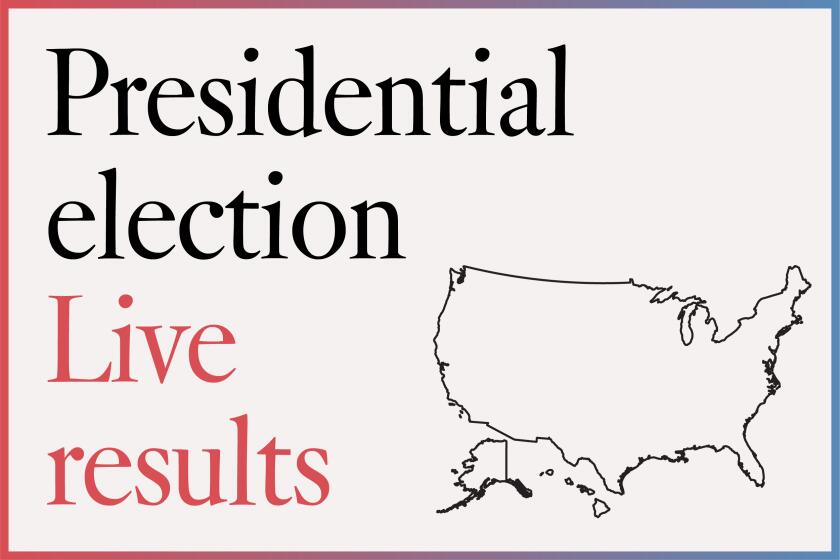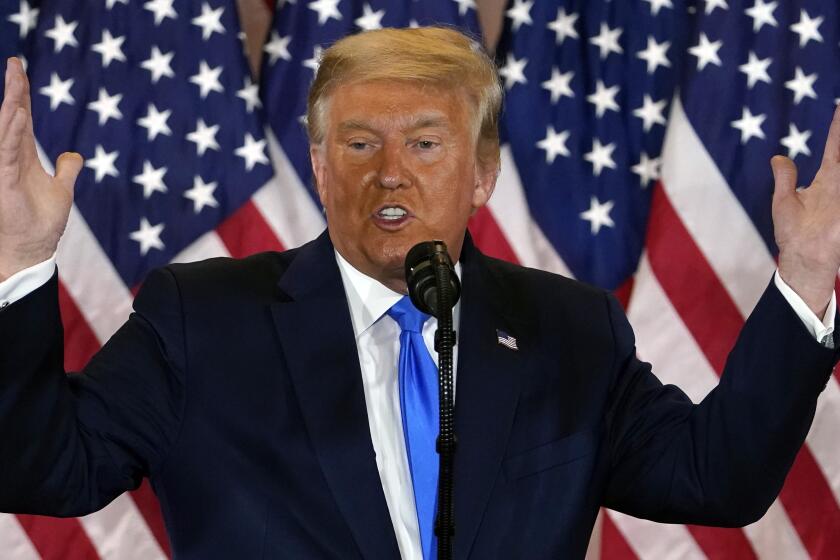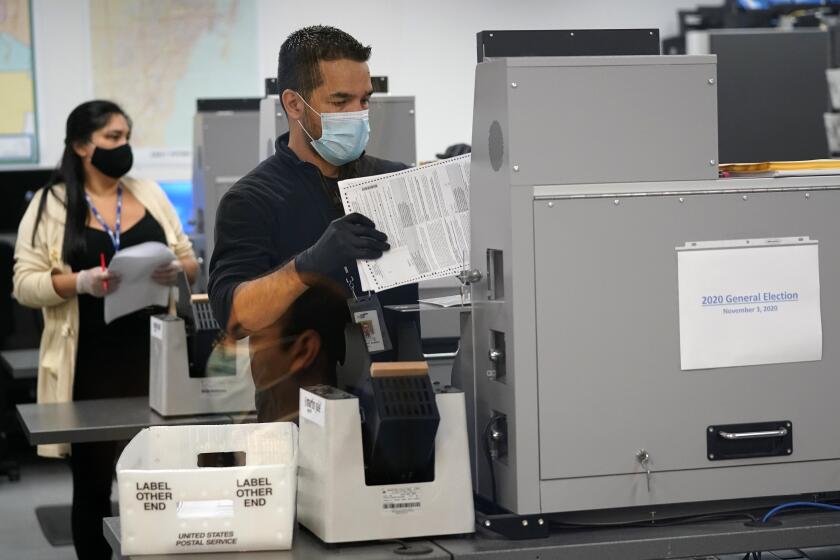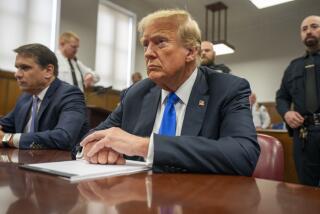Legal experts cast doubt on Trump’s bid to involve Supreme Court in election results
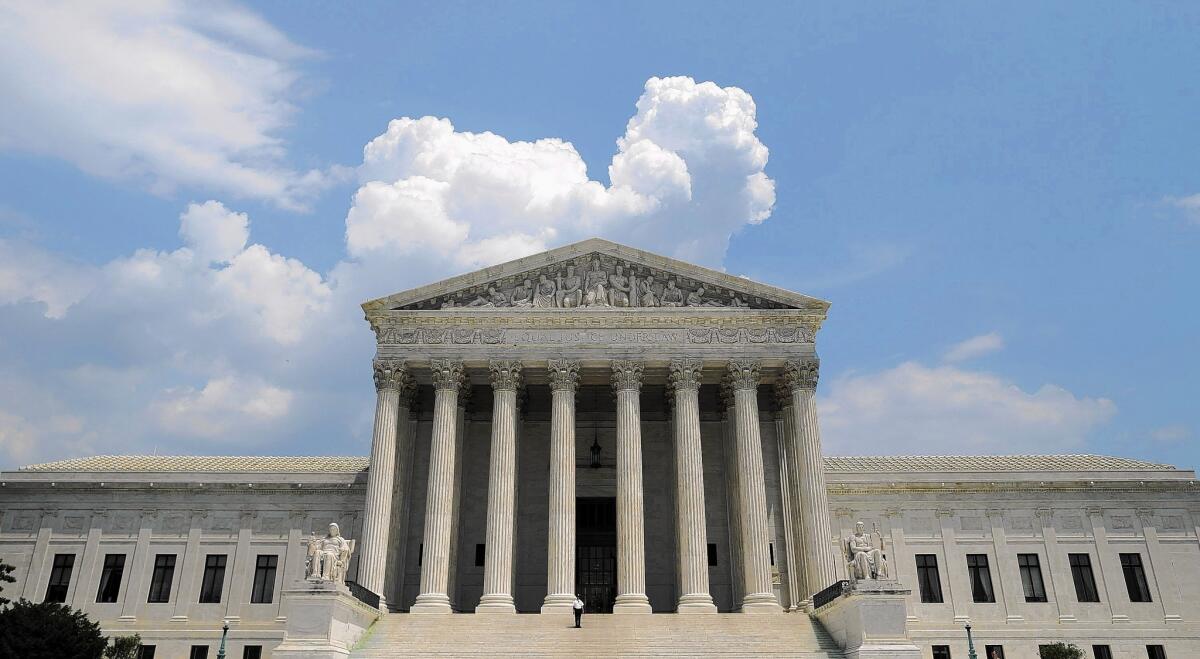
- Share via
WASHINGTON — President Trump may soon confront the problem that Al Gore faced in 2000 when he lost the crucial state of Florida by a tiny margin of about 500 votes: It is not easy to persuade judges to undo an election once the votes have been counted.
The Supreme Court’s most famous election decision in Bush vs. Gore is credited with — or blamed for — deciding the presidential race in 2000 when it halted the recount of punch card ballots. But the most important word there may have been “recount.”
Gore had gone to court to demand a new look at each ballot card that failed to register a vote. He won before a divided Florida Supreme Court on Dec. 8, a month after the election. But the justices in Washington quickly intervened to shut down the recount by a 5-4 vote, effectively declaring Bush the winner. They said the time for such litigation had run out.
Time will work against Trump, too. He has spent much of this year railing against voting by mail as suspect or fraudulent, even during a pandemic. But he and his lawyers were unable to stop the casting and counting of millions of mail ballots which on Wednesday helped Vice President Joe Biden edge into the lead in the crucial Midwest states.
Now Trump’s lawyers will try to find a legal basis for setting aside those votes, and most experts think their prospects are dim, even with the Supreme Court dominated by conservatives.
“You need a legal violation to go to court,” former White House counsel Donald McGahn said Wednesday. “It depends on state law and on the facts.”
Trump did not see that as a problem. “We will be going to the U.S. Supreme Court. We want all voting to stop,” he told supporters at the White House early Wednesday morning.
Bob Bauer, a Biden advisor and a White House counsel under President Obama, said Trump was admitting that the votes were going against him.
“He wanted the vote counting stopped because he was losing the election,” Bauer said. “He is now trying to claw his way back from defeat. This is the end of the road for these claims and for Donald Trump.”
Trump has not clearly outlined his basis for going to the Supreme Court. But his lawyers on Wednesday renewed their complaint that the Pennsylvania Supreme Court went too far when it authorized the counting of mail ballots that arrived as much as three days after Nov. 3, as long as they were in the mail by election day. So far, Pennsylvania election officials have been reporting the results of ballots that arrived by election day.
Late last month the Supreme Court on a tie vote refused to block the counting of these late ballots in Pennsylvania. Four conservatives dissented, and they may have a fifth vote now in Justice Amy Coney Barrett.
But this challenge may not have much practical impact.
“It is likely to be a very small number of votes,” and not enough to affect the outcome, said Paul Smith, a lawyer for the Campaign Legal Center. Even then, the justices who were skeptical a few weeks ago may be wary of canceling votes that were cast in line with the law as it stood on election day.
As his path to another term narrowed sharply, President Trump sent in the lawyers Wednesday, seeking to stop or reverse vote counts in three battleground states.
But the Trump campaign said it would continue the fight in the Supreme Court.
“As the president has rightly said, the Supreme Court must resolve this crucial contested legal question, so President Trump’s campaign is moving to intervene in the existing Supreme Court litigation over the Pennsylvania Supreme Court’s unlawful extension of the mail-in ballot receipt deadline,” Justin Clark, the deputy campaign manager, said in a statement.
The Trump campaign also said it was suing in Michigan and Pennsylvania seeking to assure that Republican poll observers are in place and in position to observe the counting of the remaining ballots.
Last week, Trump’s lawyers sued in Nevada to challenge the use of scanning machines in Clark County to check signatures. But a state judge rejected the complaint on Friday, and the state supreme court agreed unanimously on Tuesday there were no grounds for intervening. Trump’s lawyers could file an appeal in that case if they believe Nevada’s votes are crucial to the outcome.
Shortly after the AP declared that Biden had won Wisconsin by about 21,000 votes, Trump’s campaign manager Bill Stepien told reporters the campaign would ask for a recount there, citing “irregularities in several Wisconsin counties.”
Election 2020: These states will probably decide if Joe Biden or President Trump wins the race. And their absentee ballot laws could determine when we find out.
Rick Hasen, an election law expert at UC Irvine, said in a blog post that he was skeptical of the notion that the courts will decide the election.
“I’ve been saying consistently that the only way the 2020 presidential election ends up being decided by the courts is if there is a dispute in a state that is central to an electoral college victory, and that the dispute in that state is so close (or there is such a massive failure in the election) that the election is within the margin of litigation,” he wrote.
“As of this moment (though things can change) it does not appear that either condition will be met. It does not seem that Pennsylvania will be crucial to a Biden electoral college victory and so any litigation over ballots there would not matter.”
David Strauss, a University of Chicago law professor, said Trump didn’t help his cause by suggesting the Supreme Court was ready to ride to his rescue. The justices are all aware that the Bush vs. Gore ruling did damage to the court’s legitimacy.
“Trump’s invoking the Supreme Court is damaging for the court and for the country,” Strauss said. “He has the same attitude toward the Supreme Court that he has toward the rest of the government — that it works for him, not for the American people. It is hard to see how anyone who cares about the court, on any side of the political spectrum, would not cringe and find those comments of Trump’s to be very disturbing.”
More to Read
Get the L.A. Times Politics newsletter
Deeply reported insights into legislation, politics and policy from Sacramento, Washington and beyond. In your inbox three times per week.
You may occasionally receive promotional content from the Los Angeles Times.
